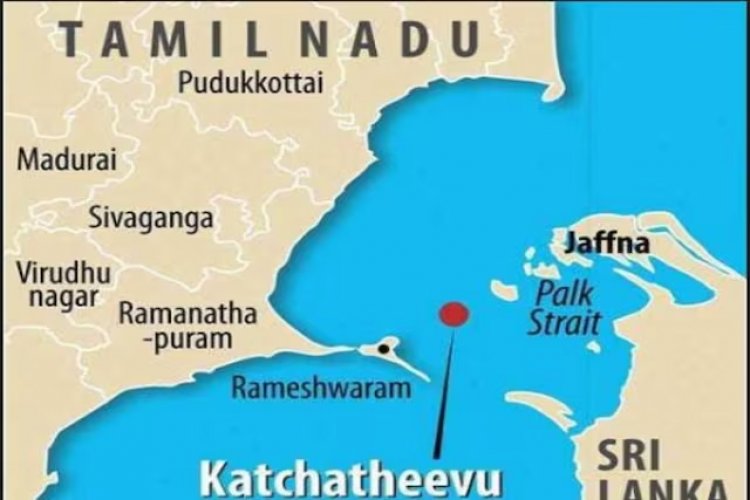India - Sri Lanka: More on Katchateevu
STORIES, ANALYSES, EXPERT VIEWS

As part of its campaign to win hearts in Tamil Nadu, the BJP has revived the issue of Katchateevu, an uninhabited, barren islet about 14 nautical miles off Rameswaram in Ramanathapuram district of Tamil Nadu. An agreement between India and Sri Lanka in June 1974 recognised Katchatheevu in the Palk Strait as a part of Sri Lanka.
Prime Minister Narendra Modi has accused the Congress’s ally, the Dravida Munnetra Kazhagam (DMK), of having done ‘nothing’ to safeguard the interests of Tamil Nadu. Responding to this, Tamil Nadu Chief Minister and DMK president M K Stalin asked PM Modi whether he had raised the issue of the ‘retrieval of the islet’ with the Sri Lankan government even once during his tenure as Prime Minister. He said that the issue was being raked up as part of the BJP’s election strategy.
Foreign policy implications
It isn’t often when a foreign policy issue generates as much heat within India’s polity, but last week, writes Suhasini Haider (Diplomatic Editor, The Hindu) “both the PM and the EAM set off a debate over a 1974 agreement with Sri Lanka that quickly saw pushback from the opposition, and some concern in Colombo.”
To recall, the issue played out in terms of foreign policy when EAM Jaishankar at a press conference expanded on a tweet by PM Modi accusing the Congress government of 1974 and the Tamil Nadu State government at the time of ‘colluding’ to ‘give away’ the island.
Haider explains the agreement was signed in 1974 and an exchange of letters in 1976 clarified the rights of both sides; that Katchatheevu, an island less than 2 square kilometres large in the Palk Strait (MAP), was found to lie on the Sri Lankan side of the International Maritime Boundary Line; that Indian fishermen did not have fishing rights around the island, but they could use the land to dry nets, and were allowed to visit the solitary structure, a church for St. Anthony, especially on the day of an annual festival there
In return, India received rights to the Wadge Bank – rich in petroleum.
Interestingly, writes Haider “when Mr. Jaishankar was Foreign Secretary in 2015, an RTI (Right To Information) by the MEA shown by the opposition actually said that the agreement did not involve ‘acquiring or ceding’ of any territory as none had been demarcated historically.
“Mr. Jaishankar also claimed that Indian fishermen are still being arrested, shot at and even killed by Sri Lankan authorities as a result of the agreement. While it is true that hundreds of Indian fishermen have been detained – about 100 a year for the past few years, they are not detained on Katchatheevu, according to a parliament reply.”
Finally, and perhaps what really was of interest to foreign policy experts “was the EAM’s contention that there needs to be a ‘solution’ to the problems created by the 1974 and 1976 agreement, although the matter remains in the Supreme Court at present.”
The questions that have been raised are over what the government plans to do next:Sri Lankan FM Sabry has said any move to reopen the 1974 and 1976 agreements bilaterally, is not on the table.
And finally, writes Haider “if the government is calling into question this agreement, then will it also take a re-look at other agreements made in the past with the intent to revise them, especially those that deal with territorial issues in the neighbourhood.”
Root cause of the problem is a conflict of interests
From the perspective of Tamil Nadu, writes V. Suryanarayan (Founding Director and Senior Professor retired, at the Centre for South and Southeast Asian Studies (CSSEAS), University of Madras) “the root cause of the problem is a conflict of interests. On the one side are the two governments which do not want to reopen the issue of Katchatheevu. On the other side are the Indian fishermen who will not easily give up a means of livelihood which they have enjoyed for several years.
“There are two interrelated issues that should be kept in mind. First, the unilateral scrapping of a bilateral agreement will have profound consequences not only on India-Sri Lanka relations but also with several of India’s other neighbouring countries. Bilateral agreements have a sanctity of their own and cannot be scrapped based on the whims and fancies of every party in power. At the same time, the Centre should be urged to take immediate steps to ensure the livelihood of fishermen on both sides of the Palk Strait. It would be unwise to attempt to create a Berlin Wall in the Palk Strait. India and Sri Lanka are like Siamese twins. What afflicts one will affect the other.”
















